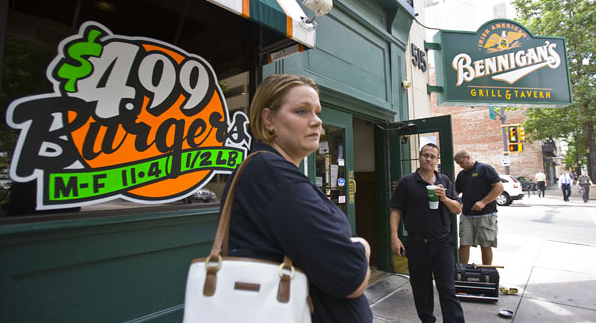“Several national restaurant chains were shuttered last Tuesday, possibly offering a early taste of what’s in store this year for businesses that depend on free-spending consumers whose budgets are now being squeezed.” Clever puns aside, this lead-in to a New York Times report says a lot. So does this photograph that accompanied the story.
We know what we are supposed to observe here: ordinary people who are glum. Some may have lost their lunch and others may have lost their jobs, but no one can see a ready alternative. The photograph itself reinforces a mildly depressive reaction: it seems a banal, cluttered, diffused shot with the lighting either dull close in or too harshly white in the background. No one of the three figures holds our attention, yet they don’t form a coherent group either as they each are alone, left with their thoughts as they go their separate ways. Arrayed along a line of sight that leads only into the open street where others go about their business, the prospects for a new start close by seem slim.
Other elements of the picture add more to the story. Look at the garish ad for $4.99 burgers. That probably includes fries as well, and in any case it’s a good example of how the US has been awash in cheap food. Look also at the guy’s supersized drink. Or her large bag–the fashion this summer–or the fact that no one in the picture has been going hungry. Even as the restaurant closes, it does so amidst signs of overconsumption. Add the American eagle from the sign in the upper right of the photo, and you’ve got a small allegory. An entire way of life based on cheap food, cheap gas, and constant consumption may be shutting down.
Bennigan’s was the casualty this time, with Steak & Ale to follow and other brands in the “causal dining” category also in jeopardy. In addition, the neighborhood or strip mall typically loses a familiar place that will help anchor the local community or business district, while the space will be hard to rent in the downturn. The sad fact is that the housing crisis, the oil crunch, the commodity price hikes, the devaluation of the dollar, the drain on the national treasury from the trillion dollar war, and similar the big-picture troubles are hardest on the little people. This closing isn’t the first and won’t be the last, and every time it happens more people have to go home and tell someone they love that that things just got worse.
I dream of the day that Main Street Republicans figure out that their interests are not served by the party of Wall Street. Maybe if enough stores close and enough people vote their interests, then local businesses can start up again, this time with health insurance and the economic security that comes from regulation, conservation, and other proven measures for a sustainable society. I’d drink to that–and maybe even go out to eat.
Photograph by Roger Mallison/Star-Telegram via Associated Press.

Great post and very thought provoking. I’ve always thought that American overconsumption was a recipe for disaster and it looks as if that disaster is upon us.
I agree with your post but don’t see how these crises will result in the re-emergence of local businesses or even if that’s necessarily desirable. Your local Main Street Chamber of Commerce is just as rabidly opposed to labor unions as Wal-Mart. In many ways, it’s harder to pressure decent wages and benefits from mom and pop businesses as from big corporations. Tiny businesses can easily and truthfully claim poverty when pressured, and unions are less likely to spend precious organizing dollars on small targets.
Finally I think Republicans (and a lot of Democrats) are too deeply committed to our national religion – THE FREE MARKET – to stray far from current policies. Economic crises can stimulate progressive social programs like the New Deal, but many people forget that worldwide economic crisis of the Great Depression also helped bring the Nazi’s to power.
Love your blog. Keep up the great work.
I like the concept of “causal dining”, but I am unsurprised that it didn’t catch on with the non-academic public – 😉